Sunday, January 27, 2008
Perceptions and reality - 2008
The Datos polling firm is one of Venezuelas largest polling and market research firms. It has been highly accurate in the past and is therefore one of the most credible polling firms in Venezuela.
For that reason it is worth some time taking a look at a presentation they gave recently on the reality and sentiments of the Venezuelan consumer:
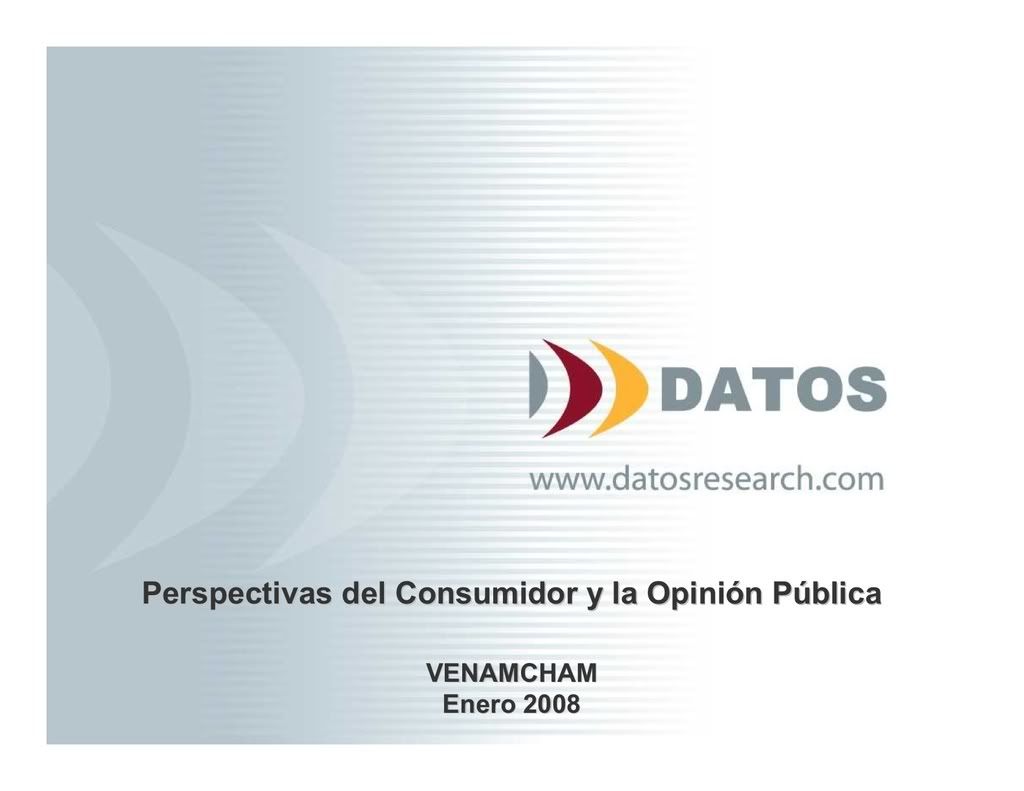
First we see some basic economic indicators that we are already familiar with:
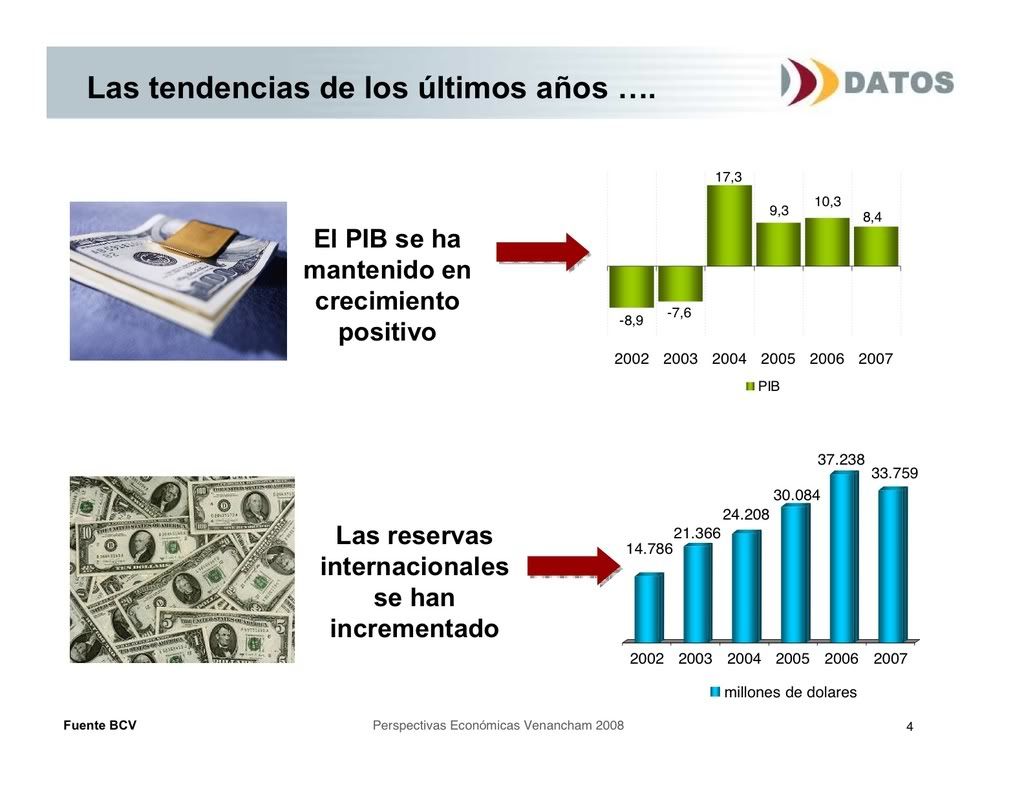
The Venezuelan economy has experienced very strong growth since recovering from the opposition led oil strike of 02/03 and international reserves have grown solidly even with money being taken out for the FONDEN development fund.
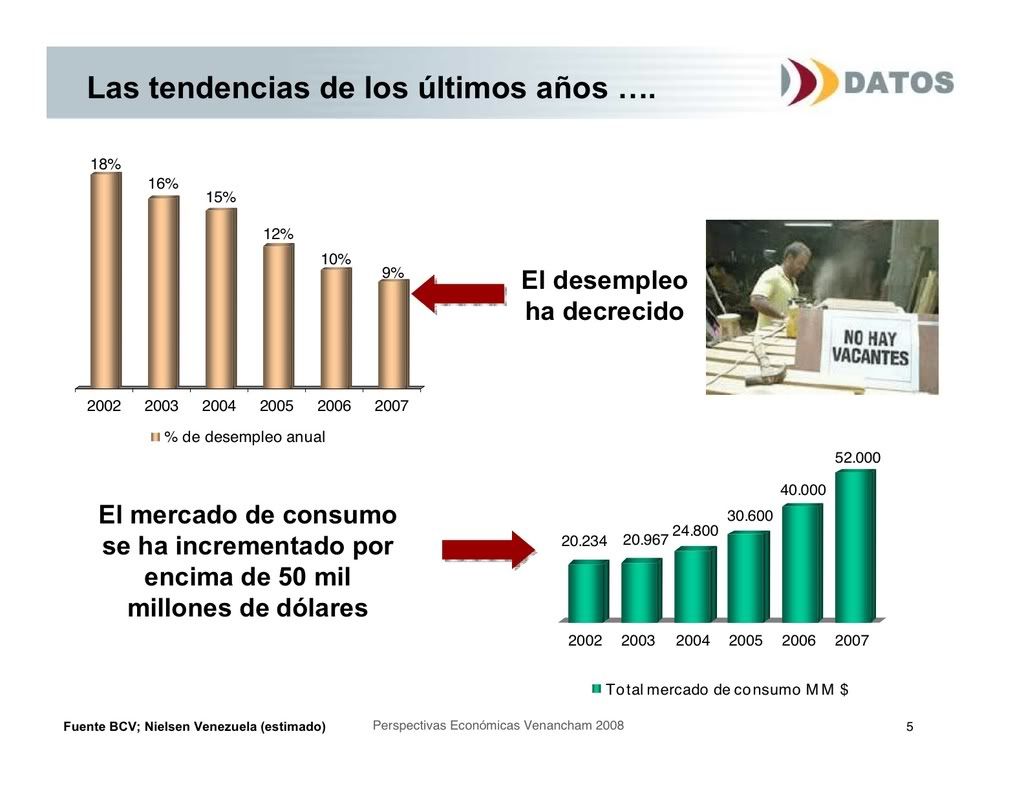
Here we see that unemployment is way down. Even more impressive we see that consumption is WAY up, having more than doubled since 2004 when the country had already recovered from the oil strike depression. Clearly peoples standard of living is WAY WAY up.
Next we see that as peoples economic problems have been alleviated other problems have moved to the fore:

In this slide we see what people identify as the major problems confronting them. On the left we have the fourth quarter of 2003 and on the right we have the final quarter of 2007. Yellow is "high cost of living/economic crisis", green is "unemployment", and red is "crime". We see that economic concerns have dropped tremendously while worry over crime has surged.
Memo to Chavez and his supporters: quit worrying about inflation - it is not a major problem (especially by historical standards) and is not nearly as worrisome to people as it used to be. Rather something must absolutely, positively be done about crime.
Here we see the effects of shortages:
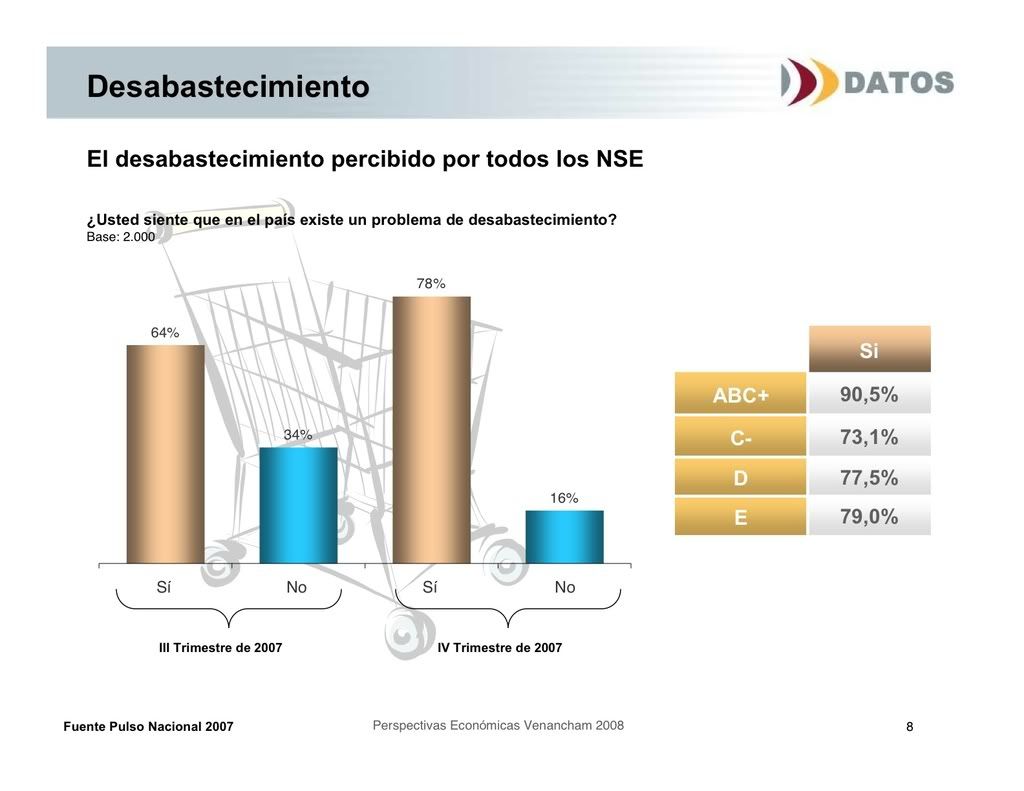
In just one quarter the problem worsened significantly. So while some objected the the solution I proposed in the previous post clearly something needs to be done.
People's political tendencies are not that surprising.
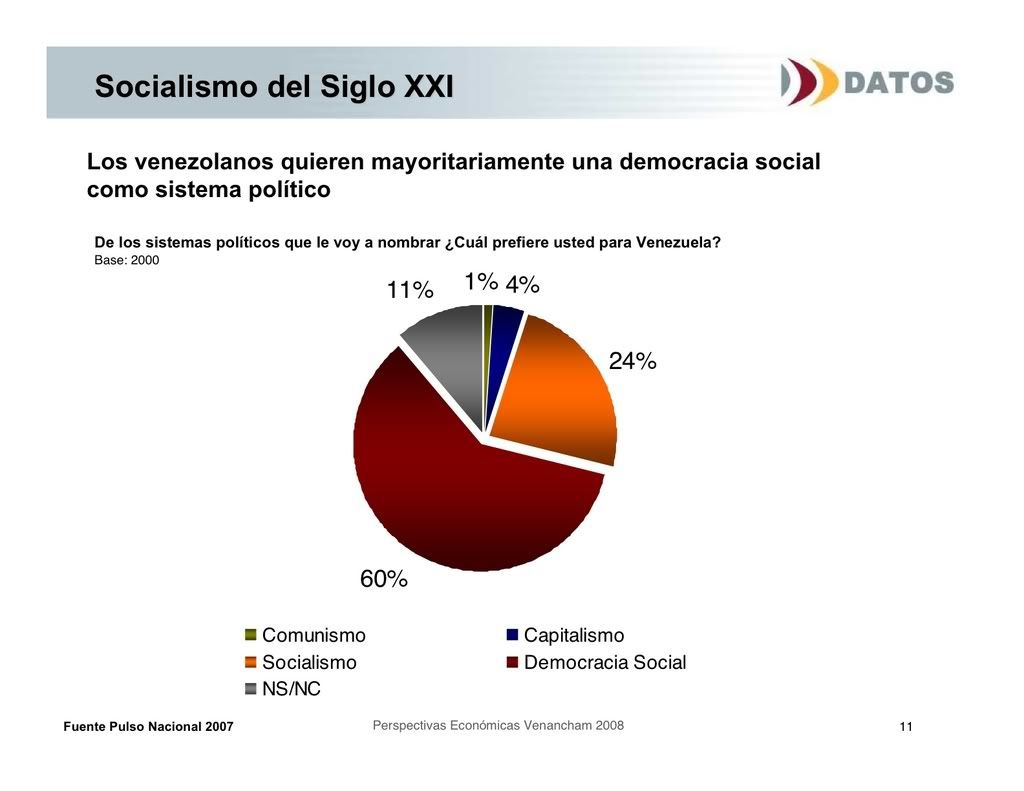
Communism is desired by 1%, socialism by 24%, social democracy by 60% and capitalism by 4%.
Venezuela is pretty far to the left compared to some places, like the United States, but it is not as leftist as Chavez would probably like.
Next we get to some interesting polling on peoples perception of their well being and the state of the economy:
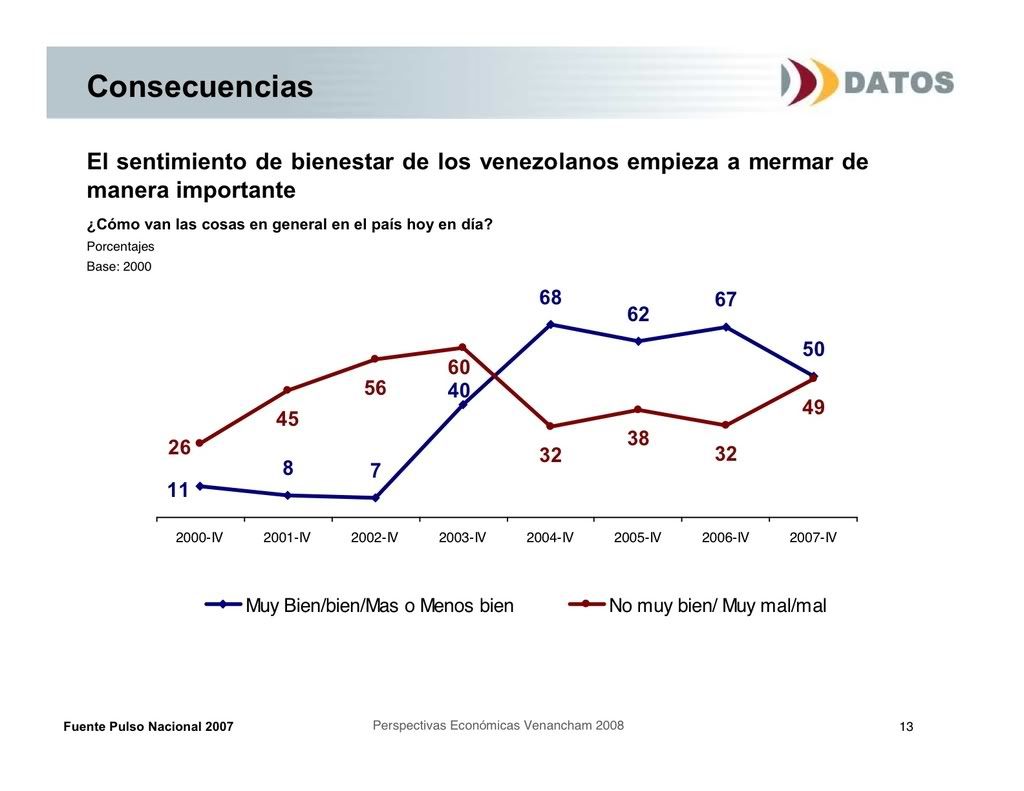
This chart shows how people think things are going in the country with the blue line indicating they are going well and the red line indicating the percentage who think it isn't going well. Note that from 2004 to 2006 a large majority thought the country was doing quite well. That has now dropped off to being basically 50/50.
I would guess Chavez's belligerence, the RCTV situation, and shortages all led to that decline.
Having said that, this is anything but catastrophic for Chavez. Note that there are no major elections scheduled this year and Chavez himself isn't even eligible for recall for two more years. Further, while mediocre these numbers are nowhere near as negative as they were between 2000 and 2003.
So there is no need to panic, just a need to start governing effectively, fix festering problems and focus on long term development strategies. Chavez shouldn't focus on the polls, they are meaningless right now. If he focuses on governing the polls will take care of themselves.
Along the same theme:

Here we see how people view the current economic situation of the country with those who think it is better in blue and those who think it is worse in red.
There is something interesting to be said about this slide. Note that most peoples PERCEPTION is that the economy is worse now than last year. Yet we saw in one of the first slides that consumption went way up last year meaning in point of fact people were better off economically in 2007 versus 2006.
Why the divergence between perception and reality?
My guess would be two things. First, in Venezuelan the opposition media is still quite powerful and are capable of creating perceptions that don't match reality. Note even in 2004 and 2005 when the economy was growing even faster than it is now most people thought the economy was worse off than before. This is just absurd when one considers that in 2004 the economy boomed by 17% whereas in the previous year the country had been in a depression. How could people in 2004 possibly say that they were worse off then than in 2003?!?!?!? Clearly the medias ability to manipulate perceptions is powerful.
Secondly, even though consumption has increased even over the past year it is possible that that consumption has become more oriented towards the upper classes. That is, fewer people are benefiting from the boom and those who are tend to be anti-Chavez and negative about the state of the economy anyways. Along with that the lower classes may have seen the increase in their consumption slow.
In prior years DATOS published slides showing how the income of the various social stata fared. In this presentation they didn't do that. So it is impossible to tell if the second point is true, but I think it quite likely.
Next we see peoples expectations about the future:
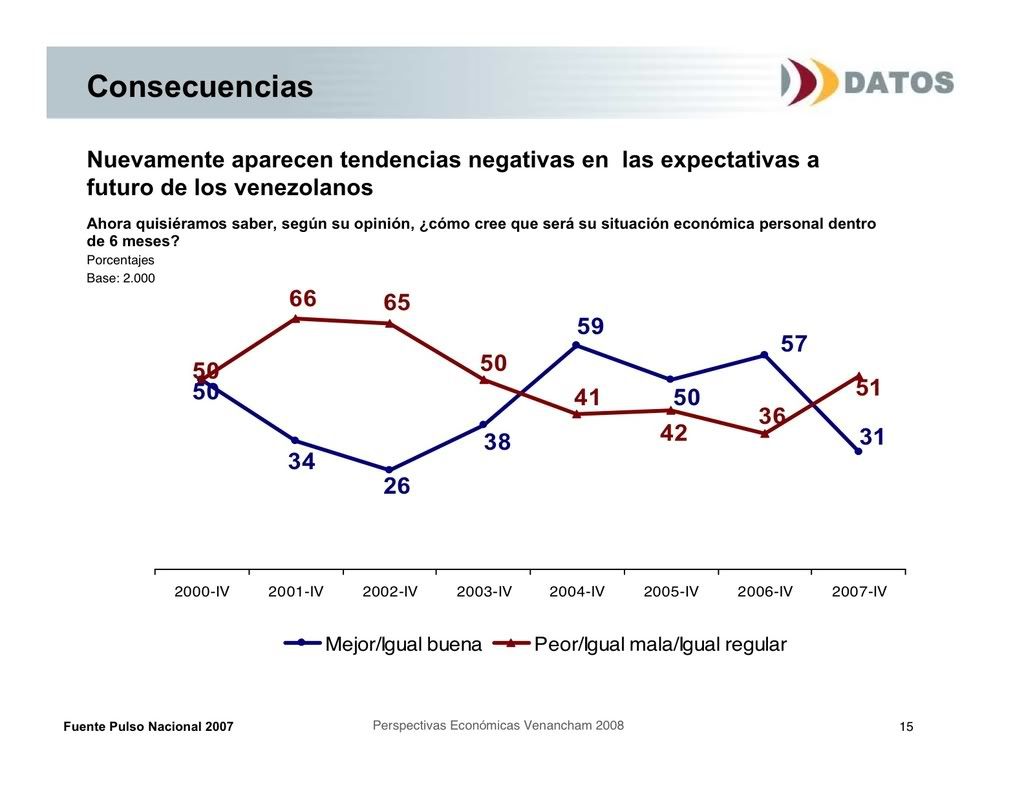
Again the blue line is for those who think the next country will be better off and the red line for those who think it will be worse off.
Finally, we see Venezuela's consumer confidence indicators:
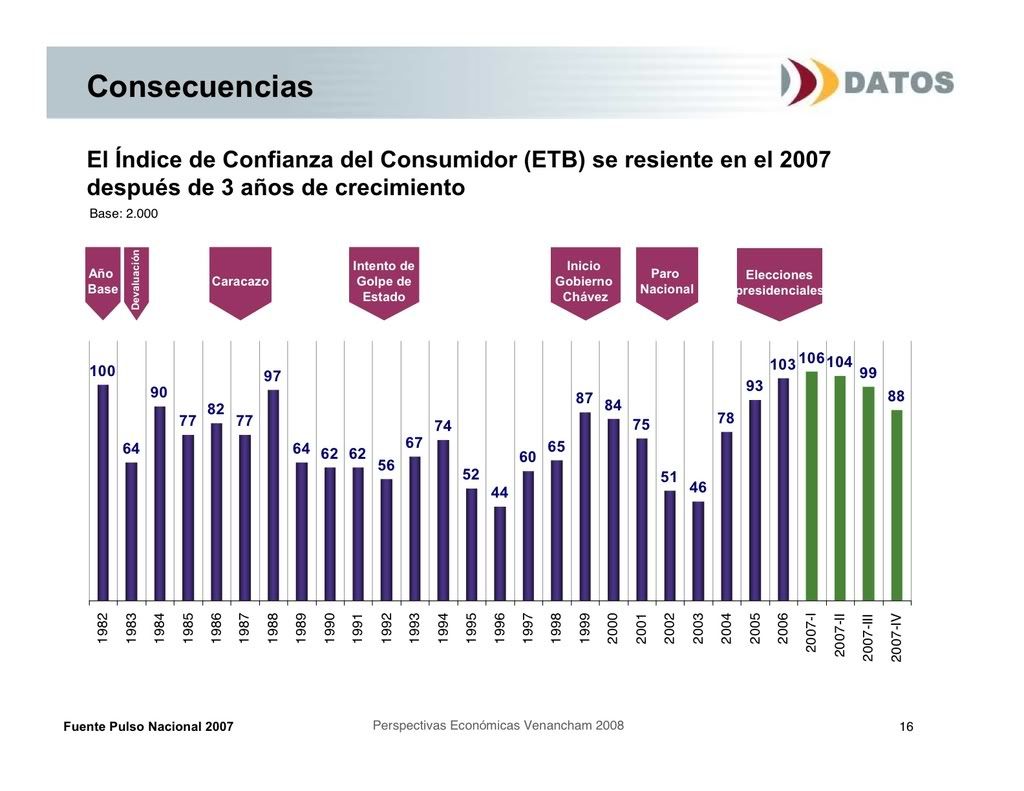
It is given annually going back to 1982 (which serves as the baseline of 100). However for 2007, which is in green, we see it for each quarter.
We see that consumer confidence dropped steadily throughout 2007 with the drop in the fourth quarter being the biggest. After years of increase clearly consumers are growing more concerned.
However, it should be noted even with it having dropped to 88 consumer confidence currently exceeds every year going back to 1988 and is higher than any of the early years of the Chavez administration.
What is the conclusion to be drawn from all this? Simple. Things have fallen off in terms of peoples perceptions and happiness over the past year or so. That is clear. However it is also clear that people are still more sanguine about the country than they have been for most all of Venezuela's recent history.
Given that while changes are in order there is no need to hit the panic button. Chavez shouldn't focus on short term fixes meant to immediately boost his, and the economies, standing in the polls. Those fixes will likely lead to worse outcomes over the medium and long term. Further, any boosting of poll numbers from those type of measure will likely dissipate before any meaningful elections come along.
Rather Chavez needs to spend time with his cabinet deliberating and coming up with serious and effective solutions to Venezuela's problems that will yield results over the medium to long term. As long as the government does that the only thing it has to fear, to paraphrase FDR, is fear itself.
|
For that reason it is worth some time taking a look at a presentation they gave recently on the reality and sentiments of the Venezuelan consumer:

First we see some basic economic indicators that we are already familiar with:

The Venezuelan economy has experienced very strong growth since recovering from the opposition led oil strike of 02/03 and international reserves have grown solidly even with money being taken out for the FONDEN development fund.

Here we see that unemployment is way down. Even more impressive we see that consumption is WAY up, having more than doubled since 2004 when the country had already recovered from the oil strike depression. Clearly peoples standard of living is WAY WAY up.
Next we see that as peoples economic problems have been alleviated other problems have moved to the fore:

In this slide we see what people identify as the major problems confronting them. On the left we have the fourth quarter of 2003 and on the right we have the final quarter of 2007. Yellow is "high cost of living/economic crisis", green is "unemployment", and red is "crime". We see that economic concerns have dropped tremendously while worry over crime has surged.
Memo to Chavez and his supporters: quit worrying about inflation - it is not a major problem (especially by historical standards) and is not nearly as worrisome to people as it used to be. Rather something must absolutely, positively be done about crime.
Here we see the effects of shortages:

In just one quarter the problem worsened significantly. So while some objected the the solution I proposed in the previous post clearly something needs to be done.
People's political tendencies are not that surprising.

Communism is desired by 1%, socialism by 24%, social democracy by 60% and capitalism by 4%.
Venezuela is pretty far to the left compared to some places, like the United States, but it is not as leftist as Chavez would probably like.
Next we get to some interesting polling on peoples perception of their well being and the state of the economy:

This chart shows how people think things are going in the country with the blue line indicating they are going well and the red line indicating the percentage who think it isn't going well. Note that from 2004 to 2006 a large majority thought the country was doing quite well. That has now dropped off to being basically 50/50.
I would guess Chavez's belligerence, the RCTV situation, and shortages all led to that decline.
Having said that, this is anything but catastrophic for Chavez. Note that there are no major elections scheduled this year and Chavez himself isn't even eligible for recall for two more years. Further, while mediocre these numbers are nowhere near as negative as they were between 2000 and 2003.
So there is no need to panic, just a need to start governing effectively, fix festering problems and focus on long term development strategies. Chavez shouldn't focus on the polls, they are meaningless right now. If he focuses on governing the polls will take care of themselves.
Along the same theme:

Here we see how people view the current economic situation of the country with those who think it is better in blue and those who think it is worse in red.
There is something interesting to be said about this slide. Note that most peoples PERCEPTION is that the economy is worse now than last year. Yet we saw in one of the first slides that consumption went way up last year meaning in point of fact people were better off economically in 2007 versus 2006.
Why the divergence between perception and reality?
My guess would be two things. First, in Venezuelan the opposition media is still quite powerful and are capable of creating perceptions that don't match reality. Note even in 2004 and 2005 when the economy was growing even faster than it is now most people thought the economy was worse off than before. This is just absurd when one considers that in 2004 the economy boomed by 17% whereas in the previous year the country had been in a depression. How could people in 2004 possibly say that they were worse off then than in 2003?!?!?!? Clearly the medias ability to manipulate perceptions is powerful.
Secondly, even though consumption has increased even over the past year it is possible that that consumption has become more oriented towards the upper classes. That is, fewer people are benefiting from the boom and those who are tend to be anti-Chavez and negative about the state of the economy anyways. Along with that the lower classes may have seen the increase in their consumption slow.
In prior years DATOS published slides showing how the income of the various social stata fared. In this presentation they didn't do that. So it is impossible to tell if the second point is true, but I think it quite likely.
Next we see peoples expectations about the future:

Again the blue line is for those who think the next country will be better off and the red line for those who think it will be worse off.
Finally, we see Venezuela's consumer confidence indicators:

It is given annually going back to 1982 (which serves as the baseline of 100). However for 2007, which is in green, we see it for each quarter.
We see that consumer confidence dropped steadily throughout 2007 with the drop in the fourth quarter being the biggest. After years of increase clearly consumers are growing more concerned.
However, it should be noted even with it having dropped to 88 consumer confidence currently exceeds every year going back to 1988 and is higher than any of the early years of the Chavez administration.
What is the conclusion to be drawn from all this? Simple. Things have fallen off in terms of peoples perceptions and happiness over the past year or so. That is clear. However it is also clear that people are still more sanguine about the country than they have been for most all of Venezuela's recent history.
Given that while changes are in order there is no need to hit the panic button. Chavez shouldn't focus on short term fixes meant to immediately boost his, and the economies, standing in the polls. Those fixes will likely lead to worse outcomes over the medium and long term. Further, any boosting of poll numbers from those type of measure will likely dissipate before any meaningful elections come along.
Rather Chavez needs to spend time with his cabinet deliberating and coming up with serious and effective solutions to Venezuela's problems that will yield results over the medium to long term. As long as the government does that the only thing it has to fear, to paraphrase FDR, is fear itself.
|
